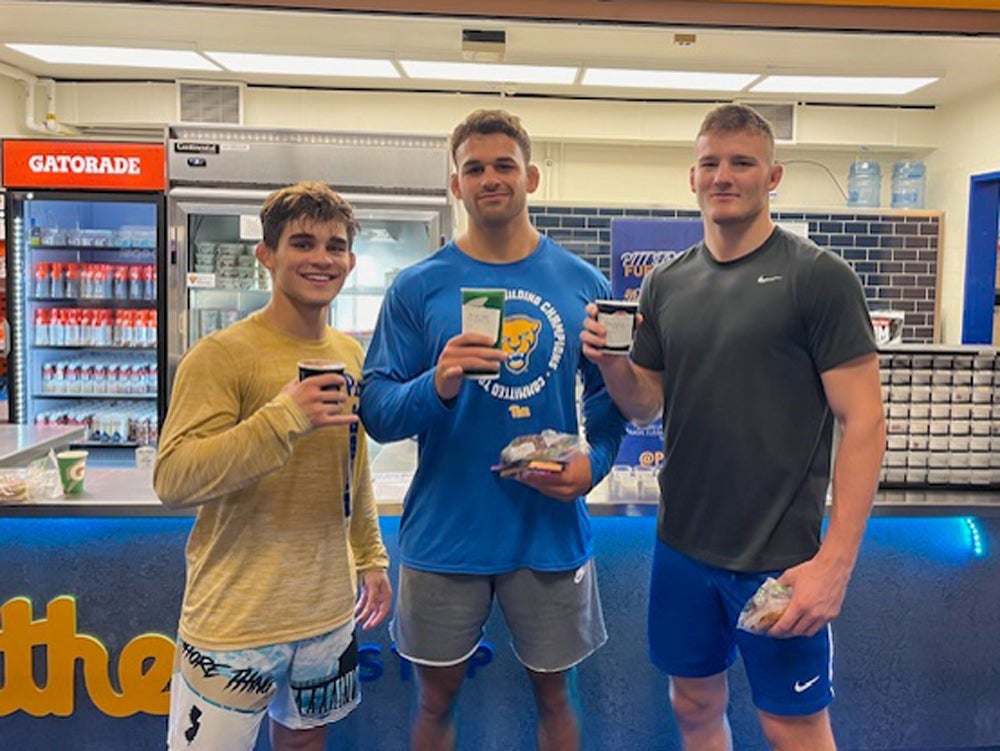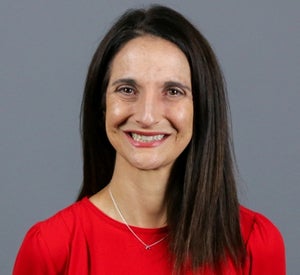In 2016, an important collaboration was built between the School of Health and Rehabilitation Sciences (SHRS) Dietitian Nutritionist (DN) program and Pitt Athletics, fostering a meaningful partnership for DN students and student-athletes alike.
Within the Dietitian Nutritionist program, students are required to complete supervised experiential learning during their final year in the program, where they are able to work in a specialized nutrition field across a 12-week rotation. Among the specialty rotations available is the Sports Nutrition specialty, which allows DN students to engage directly with student-athletes in the performance nutrition space. The specialty immerses students in the world of collegiate sports nutrition through a hands-on learning environment.
After noticing a need for more nutrition support for Pitt athletes and an opportunity for SHRS students to assist with athletes’ sports nutrition, the collaboration was forged between the two communities at Pitt.
Creating the Partnership
The Pitt Athletics Sports Nutrition program aims to optimize the health and performance of Pitt student-athletes through evidence-based resources that promote wellness. Auburn Paulone, assistant director for performance nutrition at Pitt Athletics and a registered dietitian, explained that each student-athlete receives one-on-one nutrition consultations and services such as cooking demonstrations, body composition assessments and meal planning.
The program operates within the various athletic facilities on and off campus, depending on the sport, with fueling stations conveniently located for athletes to access healthy food and drink options. The fueling stations aim to help the athletes prepare for and recover from training sessions, with items such as quick carbohydrates to fuel their activity and protein shakes to recover after. Greek yogurt, chocolate milk, oatmeal, bagels, bars, sandwiches and smoothies are all available for student-athletes.

“We provide student-athletes with the nutrition knowledge, skills and resources to strive for excellence in academics, athletics and in life,” Paulone said. “We collaborate with members of the performance team, such as sports medicine, strength and conditioning and mental health, to optimize student-athlete health and performance.”
The DN students assist with nutrition education and counseling, while supervised by an experienced dietitian, to aid daily fueling and hydration needs for student-athletes. The DN students teach the athletes about topics such as pre- and post-fueling, macronutrients and micronutrients, dietary supplements, grocery shopping, meal planning and dehydration, with the goal of supporting athletes’ success and creating positive lifelong habits with food.
Tracy Maluchnik, SHRS assistant professor within the Dietitian Nutritionist program, is the clinical instructor for the Sports Nutrition specialty rotation.
“In my Sports Nutrition class that I created and teach, I have the undergraduate students go to the Fitzgerald Field House to see what a sports registered dietitian does behind the scenes,” Malunchik said. “They also are able to work directly with the athletes by creating nourishing smoothies, working at the fueling station, offering pre/post supplements and educating them on nutritional needs.”

Impact of the Collaboration
With the help of DN students providing nutrition knowledge, Paulone said there have been noticeable improvements in athlete performance and overall health.
“We have seen enhanced performance because athletes are fueling better and feeling better,” Paulone said. “We have also spent a lot of time teaching them cooking skills, so they have more confidence in the kitchen to create basic meals and ultimately be healthier and better fueled for training and competition.”
In the classroom setting, Maluchnik sees these impacts as well.
“This collaboration benefits both the students and the athletes they support,” Maluchnik said. “This program provides a snapshot of the demands of these athletes and offers an opportunity to see the impact of micro and macronutrient fueling.”
Nutrition’s Evolution Over the Years
As nutrition education and awareness have become more prevalent, Paulone has recognized the ways in which nutrition has changed for student-athletes over the years.
“We have been able to provide more individualized and specialized nutrition care to our student-athletes,” Paulone said. “We have also incorporated more opportunities for cooking demos and learning basic cooking skills, injury nutrition education and return-to-play nutrition programs for injured or post-surgical student-athletes.”
With nutrition education for athletes on the rise, Maluchnik said that the need for more dietitians in the sports sphere has increased as well, prompting more SHRS students to seek out the competitive Sports Nutrition specialty rotation.
“It is so exciting to see the plethora of employment opportunities available in sports nutrition,” Maluchnik said. “More consumers and athletes are starting to understand the direct connection between proper fueling and performance. We adapt and provide various case studies and learning opportunities for students to understand the exciting field of nutrition and dietetics.”

The collaboration between SHRS Dietitian Nutritionist students and Pitt Athletics has created lasting impacts—both on the wellbeing of student-athletes and on the hands-on experiences the DN students have gained.
“We always say it takes a village to fuel champions,” Paulone said. “The support of the DN students allows for more nutrition care to be spread across our teams and student-athletes. This allows for more nutritional education opportunities with our athletes that ultimately lead to behavior change on the field and court or in everyday life.”
Be on the lookout for the upcoming series of stories from the Dietitian Nutritionist students who are working to fuel Pitt athletes! Read about Nicole Chiu’s (DN ’26) experience here.
Related Stories

Read about Dietitian Nutritionist student Nicole Chiu’s experience with Pitt Athletics as she prepares for her Sports Nutrition specialty rotation.

Read about Dietitian Nutritionist student Nick Sage’s journey through the SHRS Nutrition Science and Sports Science programs and how they led him to the Sports Nutrition specialty rotation to become a sports dietitian.

Read about Dietitian Nutritionist student Mia Huber’s passion for nutrition and athletics as she anticipates her Sports Nutrition specialty rotation with Pitt Athletics.

